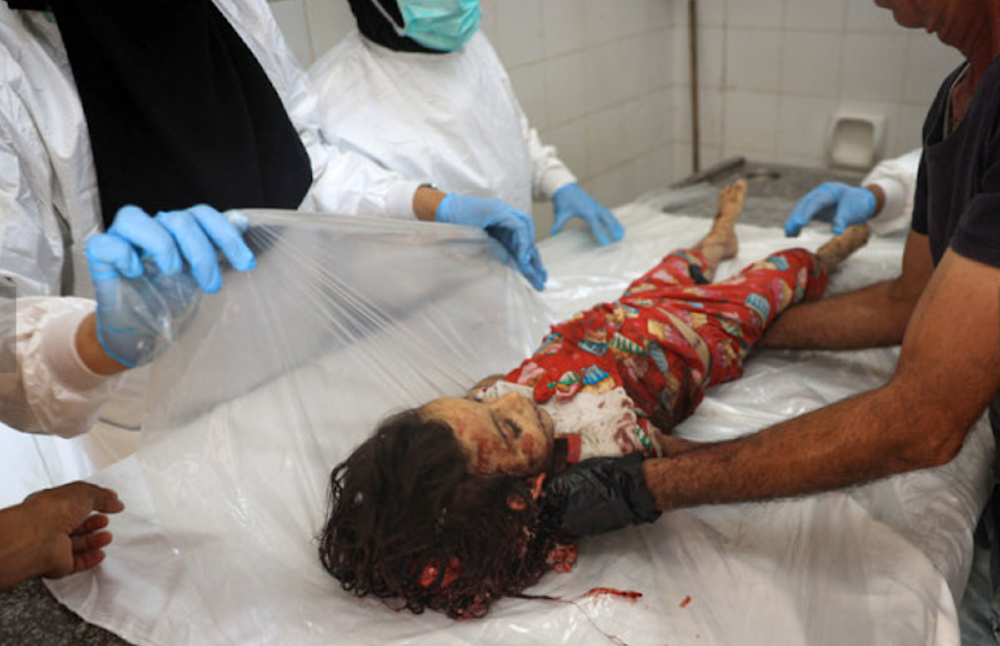UK-made F-35 parts linked to Gaza al-Mawasi tent massacre one year ago
Survivors of the al-Mawasi massacre are still suffering from severe psychological trauma, expressing how discovering the UK's role only deepens their pain.
-

Medical personnel at al-Aqsa Martyrs hospital prepare a young victim for burial after she was killed in an Israeli bombing in Deir al-Balah in the central Gaza Strip on July 13, 2024. (AFP)
One year ago today, the beach at al-Mawasi in Gaza, designated by "Israel" as a “safe zone", became the site of a devastating massacre.
Israeli warplanes launched missile strikes on tents sheltering displaced civilians who had gathered to receive food aid. According to Gaza’s Ministry of Health, the attack killed over 90 people and injured more than 300, many of them women and children.
A massacre in a 'safe zone'
Survivors continue to grapple with the trauma and are calling out the international community, particularly the UK, for its moral and humanitarian complicity. Their outrage deepened upon learning that the F-35 fighter jets used in the assault were partially manufactured in Britain. Despite widespread criticism, a UK judge ruled just last month that the government may continue supplying spare parts for those aircraft.
Thuraya Moammar, a displaced woman from northern Gaza, was in her tent with her family when the bombing began. She recalled in an interview for Declassified how she heard missiles before realizing "not a single tent was left."
Still suffering from severe psychological trauma, Thuraya said the discovery of the UK’s role only deepened her pain.
“When I found out that the plane that destroyed our tents and killed our neighbors was partially made in Britain, I felt like we’re not just dying from Israeli missiles – but also from court rulings made far away, by people who know nothing about our children.”
'All we found there was death'
Majed Awad, a displaced resident from Jabalia in northern Gaza, was standing in line for food aid from UNRWA when the airstrike hit.
“We were in line waiting for food for our children," he said. "Suddenly, the aid was covered in blood, and the queues turned into scattered bodies. How can you bomb hungry people waiting for their food?”
His voice heavy with disbelief and fury, Majed added, “When we hear that a judge in Britain approved the continued sale of parts for the planes that bombed us, it feels as if our lives were completely disregarded as if our suffering means nothing to them.”
Mohammed al-Maznar, displaced from western Gaza City, recounts the attack as though it happened yesterday, detailing how explosives rained down on him and his family.
“Children and debris were thrown into the air. My nephew was just about to enter the tent when a piece of shrapnel struck his head. He was killed instantly. They told us Al-Mawasi was a safe zone," he continued, "but all we found there was death.”
Raising his hand, Mohammed pointed skyward. “There were no doves of peace flying above us, only warplanes, parts of which were made in British factories. Don’t our lives matter at all?”
From legal advice to complicity
Eleven days after the al-Mawasi massacre, UK government lawyers formally advised Foreign Secretary David Lammy that “overall, Israel is not committed to complying” with international humanitarian law, according to court documents.
Yet despite this legal assessment, Britain’s Labour government waited nearly six more weeks before imposing any arms restrictions on "Israel". During that time, at least two shipments of F-35 fighter jet parts were sent directly to "Israel".
Loopholed ban
Even when restrictions were eventually introduced, they included a loophole, permitting the continued transfer of F-35 components from the UK to "Israel" as long as they were routed through a third country.
For civilians in Gaza, the consequences of these arms exports are life-shattering. Heba Nuweijeh, a displaced woman from Rafah in southern Gaza, had recently earned her law degree but never had the chance to practice due to the war.
After receiving an evacuation order, she and her family sought shelter in al-Mawasi. “They told us Al-Mawasi was safe," she recalled. "We arrived, and just days later, we were attacked."
Buried under the sand
Buried under the sand by a missile strike in what was declared a "safe zone", Heba Nuweijeh recalls barely being able to lift her hand to signal rescuers. Choking on gunpowder and dust, she was eventually pulled from the rubble, only to find her husband and children unconscious, thrown several meters by the blast.
When asked how she felt knowing the aircraft used in the attack was partly manufactured in Britain, Heba responded with anguish, “How can Britain – the country that once taught us it was the mother of law – take part in the killing of my children?"
"Israel" claimed the strike targeted senior Hamas commanders Mohammed Deif and Rafa Salameh. While Hamas later confirmed Deif’s death, the Israeli military has not explained the massive civilian toll. The UN condemned the strike as disproportionately deadly.
For survivors like Heba, the trauma is compounded by a sense of betrayal, not only by the occupiers who bombed them, but by foreign governments and legal systems that either turned a blind eye or directly enabled the violence.
Their lingering question cuts to the core, “How can those who equip these wings of death sleep at night? And how does a judge in Britain justify leaving us under the bombs?”

 5 Min Read
5 Min Read








